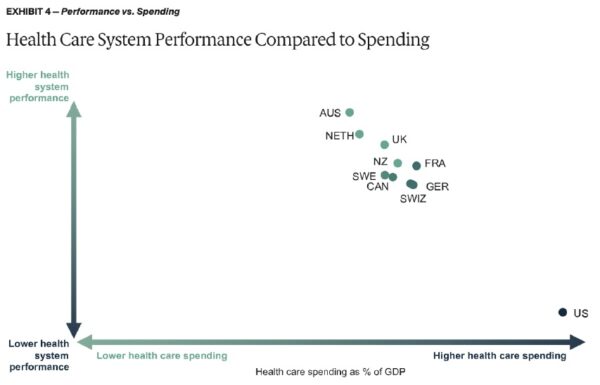Twenty Years of Failing Health System Report Cards
Since 2004, the Commonwealth Fund has done annual comparisons of health system performance among wealthy nations. The US consistently underperforms the others, and 2024 extends the streak: we are the worst, by a wide margin. Replacing our massively dysfunctional insurance morass is long overdue.
September 24, 2024
Mirror, Mirror 2024: A Portrait of the Failing U.S. Health System; Comparing Performance in 10 Nations
Commonwealth Fund
September 19, 2024
By David Blumenthal et al.
Conclusion: The U.S. continues to be in a class by itself in the underperformance of its health care sector. While the other nine countries differ in the details of their systems and in their performance on domains, unlike the U.S., they all have found a way to meet their residents’ most basic health care needs, including universal coverage.

Screenshot

Screenshot
Comment by: Jim Kahn
My comment today is brief, because this is “just” another annual iteration of findings from the venerable Commonwealth wealthy nations health system comparison. As always: the US lags far behind other nations. If I’m permitted a little tongue-in-cheek for a dire situation: The US is a consistent global leader if the goal is to rank last on health system performance metrics of central importance to patients.
We’re last on access, equity, and outcomes. The only result that baffled me is administrative efficiency, with Switzerland reported as worse than the US. Turns out, that’s because the metric doesn’t include the hundreds of billions diverted to insurers for profits, which Swiss insurers don’t get on the primary insurance plan. So, really, we’re last in that category too. We do well on care processes – we offer amongst the best care in the world, if you can afford it.
Why are other nations doing so much better? Because “have found a way to meet their residents’ most basic health care needs, including universal coverage.” Sounds like single payer to me (or, in some nations, identical broad benefits managed by not-for-profit insurers).
Check out the full report. It’s elegantly conceived and written. We can only hope that in the next 20 years, the findings will evolve to place the US among other wealthy nations in health system performance.
About the Commentator, Jim Kahn
Jim (James G.) Kahn, MD, MPH (editor) is an Emeritus Professor of Health Policy, Epidemiology, and Global Health at the University of California, San Francisco. His work focuses on the cost and effectiveness of prevention and treatment interventions in low and middle income countries, and on single payer economics in the U.S. He has studied, advocated, and educated on single payer since the 1994 campaign for Prop 186 in California, including two years as chair of Physicians for a National Health Program California.
See All PostsYou might also be interested in...
Recent and Related Posts
Premier Medical Journal Scrutinizes Corporatization of US Health Care
Laying out the Ill-Effects of Medicaid Cuts in the Congressional Budget Bill
